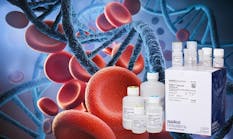Loss of a gene known as SYNCRIP in prostate cancer tumors unleashes cellular machinery that creates random mutations throughout the genome that drive resistance to targeted treatments, a team led by UT Southwestern Medical Center researchers discovered. The findings, published in Cancer Cell, could lead to new interventions that thwart this process in prostate and other cancer types, making them far easier to treat.
Ping Mu, Ph.D. and his colleagues looked for genetic differences in the cells of prostate cancer tumors – the focus of the Mu lab – from samples taken from xenografted human tumors before and after the administration of antiandrogen therapy, a common treatment that starves prostate cancers of sex hormones that can fuel their growth. Although this treatment is often initially effective, prostate tumors nearly always become resistant to antiandrogen therapy over time.
In about half of the post-treatment samples, the SYNCRIP gene had disappeared. The researchers also found a variety of mutations that bore the signature of APOBEC proteins, cellular machinery that produces a specific type of mutation used for immune defense in healthy cells.
Further experiments suggested that SYNCRIP serves as a brake for a major member of the APOBEC protein family, known as APOBEC3B, keeping its activity in check. When SYNCRIP is lost, Dr. Mu explained, APOBEC3B’s function becomes uncontrolled, causing it to create random mutations throughout the genome. When the researchers genetically altered cells to remove APOBEC3B, they didn’t accumulate mutations, even in the absence of SYNCRIP, confirming that their roles are linked.
Searching for genetic drivers of treatment resistance that arise from this process, the researchers scanned the genomes of post-treatment cells for APOBEC-caused mutations that prompted genes to become overactive. They identified eight genes that appear to be hot spots for APOBEC-driven mutations, all of which made antiandrogen therapy ineffective. When the researchers deleted these genes from the cells, they became responsive to therapy again.
Because mutations with APOBEC signatures are found in about 70% of human cancers, Dr. Mu said, the findings shed light on several mysteries in oncology. Those include why cancerous tumors tend to develop so many mutations quickly and why the mutation pattern is heterogeneous for different patients with the same cancer type and often among different cells in the same tumor.





